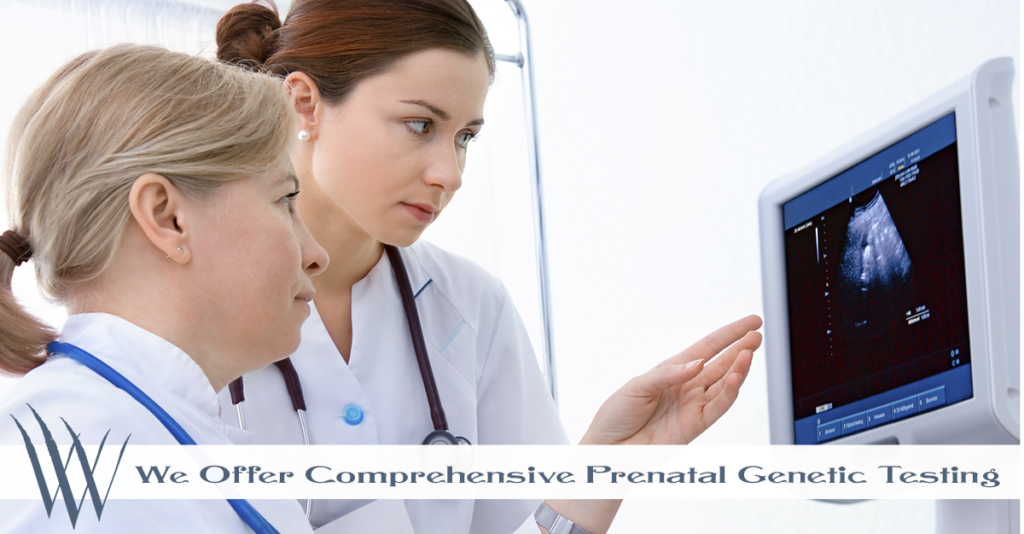Leaders in Tampa Obstetrics: Prenatal Genetic Screening Tests
At The Woman’s Group, we are leaders in Tampa obstetrics services for women. We know that the emotional and physical health of expectant mothers has much to do with the overall satisfaction in the birth experience, and ultimately, the health of her baby. We offer comprehensive prenatal genetic screening for your health and ultimately, your peace of mind.
Here are a few frequently asked questions about genetic screening from the American Congress of Obstetricians and Gynecologists (ACOG). You can learn more info on their website.
What is prenatal genetic testing?
Prenatal genetic testing gives parents-to-be information about whether their fetus has certain genetic disorders.
What are genetic disorders?
Genetic disorders are caused by changes in a person’s genes or chromosomes. Aneuploidy is a condition in which there are missing or extra chromosomes. In a trisomy, there is an extra chromosome. In a monosomy, a chromosome is missing. Inherited disorders are caused by changes in genes called mutations. Inherited disorders include sickle cell disease, cystic fibrosis, Tay–Sachs disease, and many others.
What are the two main types of prenatal genetic tests?
1. Prenatal screening tests: These tests can tell you the chances that your fetus has an aneuploidy and a few additional disorders.
2. Prenatal diagnostic tests: These tests can tell you whether your fetus actually has certain disorders. These tests are done on cells from the fetus or placenta obtained through amniocentesis or chorionic villus sampling (CVS). More on these tests are available on the ACOG website and in our office. Ask your doctor.
What are the different types of prenatal genetic screening tests?
Screening tests can tell you your risk of having a baby with certain disorders. They include carrier screening and prenatal genetic screening tests:
Carrier screening is done on parents (or those just thinking about becoming parents) using a blood sample or tissue sample swabbed from inside the cheek. These tests are used to find out whether a person carries a gene for certain inherited disorders. Carrier screening can be done before or during pregnancy.
Prenatal genetic screening tests of the pregnant woman’s blood and findings from ultrasound exams can screen the fetus for aneuploidy; defects of the brain and spine called neural tube defects; and some defects of the abdomen, heart, and facial features. This FAQ focuses on these tests. They include first-trimester screening, second-trimester screening, combined first- and second-trimester screening, and cell-free DNA testing.
What is first-trimester screening?
First-trimester screening includes a test of the pregnant woman’s blood and an ultrasound exam. Both tests usually are performed together and are done between 10 weeks and 13 weeks of pregnancy:
– The blood test measures the level of two substances.
– The ultrasound exam, called a nuchal translucency screening, measures the thickness of a space at the back of the fetus’s neck. An abnormal measurement means there is an increased risk that the fetus has Down syndrome or another type of aneuploidy. It also is linked to physical defects of the heart, abdominal wall, and skeleton.
What is second-trimester screening?
Second-trimester screening includes the following tests:
– The “quad” or “quadruple” blood test measures the levels of four different substances in your blood. The quad test screens for Down syndrome, trisomy 18, and neural tube defects. It is done between 15 weeks and 22 weeks of pregnancy.
– An ultrasound exam done between 18 weeks and 20 weeks of pregnancy checks for major physical defects in the brain and spine, facial features, abdomen, heart, and limbs.
What should I consider when deciding whether to have prenatal genetic testing?
It is your choice whether to have prenatal testing. Your personal beliefs and values are important factors in the decision about prenatal testing.
It can be helpful to think about how you would use the results of prenatal screening tests in your pregnancy care. Remember that a positive screening test tells you only that you are at higher risk of having a baby with Down syndrome or another aneuploidy. A diagnostic test should be done if you want to know a more certain result.
If you have further questions, talk to your doctor at The Woman’s Group.
This information is available at: http://www.acog.org/Patients/FAQs/Prenatal-Genetic-Screening-Tests


Comments (1)
I’d like the make a pre-pregnancy genetic screening.